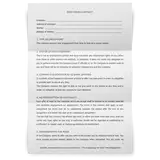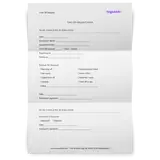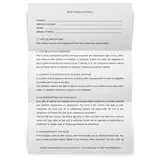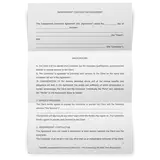Business relationships between multiple parties can get complicated fast! That’s why it’s so important to get the nature of the relationship outlined in an easy to understand contract.
Here’s a closer look at what a business contract is, when you may need one, and how to make sure your business contract template is built for success!
Here’s a sample Business Contract template that can be easily customized and adapted to meet your requirements. It’s free to download and use.
What is a Business Contract?
A business contract is simply a written agreement that helps to define a relationship between two different businesses. When business relationships become more complex, it’s often much easier for both parties to have their roles, responsibilities, and expectations outlined in a document.
If you’re not quite sure how to structure your business contract, you can find a variety of sample business contracts covering general topics like partnerships, sales or services agreements, and indemnity.
Situations Where a Business Contract Comes in Handy
Exchange of Goods or Services
This is one of the most common types of situations where a formal business contract template is necessary. When one business requires goods or services from another business on an ongoing basis, it is oftentimes much easier to create a standing contract that is good for a specified period of time. This gives both parties the ability to prepare and budget their resources related to the exchange of goods/services.
Partnerships
Organizations of all shapes and sizes enter into complementary long-term relationships with other organizations to form partnerships, and this is another situation where a business contract template might come in handy.
It is important to note here that partnerships are a two-way relationship – meaning both parties have certain responsibilities or deliverables that they are expected to contribute. Business contracts in this scenario help to ensure that both parties are aligned and have an idea of the expectations of the relationship.
Collaborations
Short-term collaborations are another type of business relationship where a contract is important. When combining forces for a brief project, the details and expectations of each party can be tricky to navigate without a shared source of truth. This shared document or ‘contract’ can help to both define the relationship and ensure that both parties are protected in the event that one party does not fufill their duties.
Best Practices for Using Your Business Contract Template
Be specific
When writing your own B2B contract template, try to be as specific as possible. While you may think that both parties have a clear understanding of their responsibilities in the beginning phases of the relationship, it will be very difficult to hold one another accountable down the road without a contract to reference. That’s why it is paramount to be as specific as possible when drafting your expectations, deliverables, pricing, and other agreements in your contract.
Take time to iterate
Adapting a business contract sample document into a contract for your own project can take some time – but that’s okay! All parties involved may need some time to mull over the details, and you want to allow enough time and space for that to happen. When facilitating the contract negotiation process, make sure to build in time for a few iteration rounds so that both parties are happy with the end result.
Think of your contract as a way to build trust
Most people do not like the process of drafting and negotiating a business contract. However, it’s important to think of the process as a way to build a sense of trust and mutual understanding between both parties. It’s also a great opportunity for both parties to see how the other works and communicates, which can help to strengthen the relationship over time.
Keep it on file in an accessible place
You never know when you may need to reference your contract – especially in the event that something comes up or one party does not fulfill their requirements. That’s why it is so important to always keep your contract in a safe place where you can easily reference it when communicating.
You may also want to keep a file of company contract samples so that you can always have a starting point when drafting new contracts for new business relationships.
Myth busting: common misconceptions about business contracts
Business contracts are essential for defining the terms and conditions of professional relationships, but several misconceptions can lead to misunderstandings. Let's address and clarify five common myths related to business contracts to enhance your understanding of this critical aspect of business operations.
Myth 1: contract templates are not reliable
Clarification: Contract templates are a valuable starting point for drafting agreements. Many free contract templates and business contract templates are available that provide a solid foundation for various types of agreements, such as rental agreements, employment contracts, and partnership agreements. However, it is always recommended to seek legal advice to ensure that the template is appropriately customized to meet your specific needs and complies with relevant laws.
Myth 2: a handshake or verbal agreement is enough
Clarification: While a handshake or verbal agreement might signify trust, it does not hold up in legal disputes like a legally binding document. A legal contract provides clear terms and conditions that are enforceable in court. Documenting agreements in writing, such as through a contract agreement or employment agreement, helps protect all parties involved by clearly outlining responsibilities and expectations.
Myth 3: all business contracts are complicated and difficult to understand
Clarification: Not all business contracts are complex. Using simple contract templates or agreement templates can make the process straightforward. Templates for service agreements, sales agreements, and employment contracts are designed to be user-friendly, with clear sections for important details like payment terms and governing law. Even so, consulting with a legal professional can help ensure clarity and compliance.
Myth 4: you don't need a contract for short-term or small transactions
Clarification: Regardless of the duration or size of the transaction, having a legally binding agreement is important. Whether it’s a short-term rental agreement or a small-scale service agreement, a written contract helps prevent misunderstandings and provides legal protection. Even for minor transactions, clear documentation of the terms ensures that both parties are on the same page.
Myth 5: free business contract templates are not as good as paid ones
Clarification: Free business contract templates can be just as effective as paid versions when used correctly. These templates cover a wide range of agreements, including partnership agreements, commercial lease agreements, and employment contract templates. The key is to ensure that the template is customized to fit your specific situation and complies with local laws. Seeking legal advice can enhance the reliability of free templates, ensuring they are robust and enforceable.
By understanding these myths and the facts behind them, businesses can utilize contracts more effectively to protect their interests and facilitate smooth operations. Utilizing various legal documents and business contract templates while consulting with legal professionals can help ensure that all agreements are clear, fair, and legally binding.
![Get It In Writing With Our Free Business Contract Template [Free Download]](/static/image?src=https%3A%2F%2Fcdnblog.unrubble.com%2Fpayload-unrubble-images%2FBusiness-Contract-Template-600x600.png&width=512&height=512&fit=contain&position=center&quality=65&compressionLevel=9&loop=0&delay=100&crop=null&contentType=image%2Fwebp)




